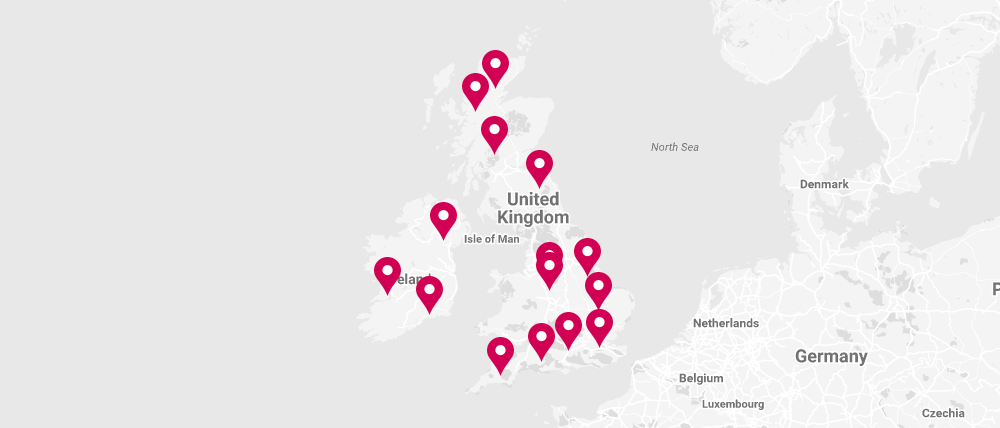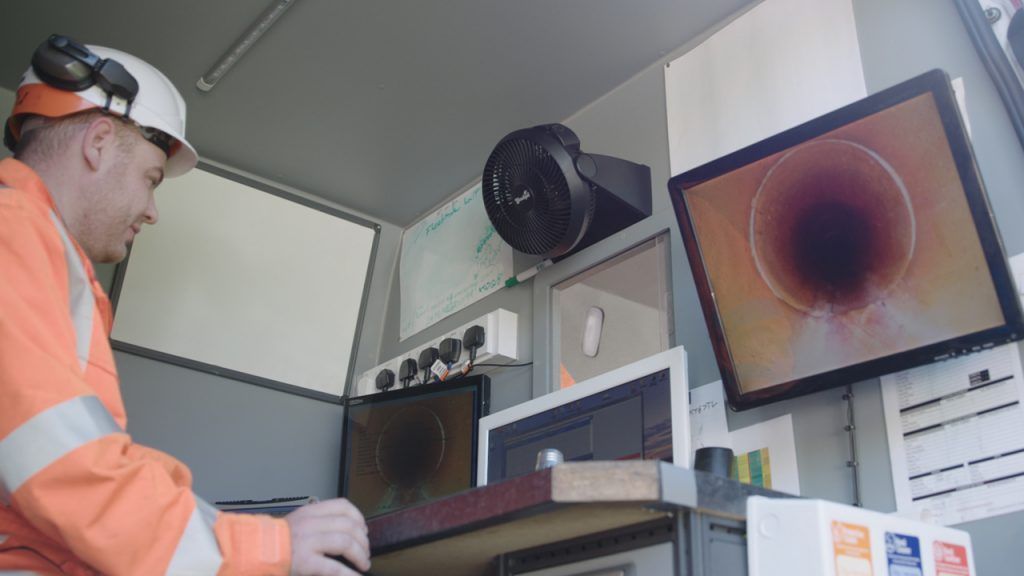
Resources
What Does a Drainage Engineer Do?
- 4th February
Drainage engineers keep the country running. They are responsible for inspecting, maintaining and designing systems that move water and sewage safely, reliably and efficiently every single day. Without them, homes would flood, roads would close and entire drainage systems would quickly fail under pressure. As one of the UK’s largest employers of drainage engineers, Lanes Group knows how broad and varied the role can be. From hands-on maintenance and emergency callouts to technical design and infrastructure planning, it takes a wide set of skills to keep drainage networks working properly. In this guide, we’ll explain what drainage engineers do, where they work, how to become one, and what kind of career progression is available in this sector.
What is a drainage engineer?
A drainage engineer is a trained civil engineering professional who maintains and repairs systems that move water or sewage from one location to another. These systems might use underground pipes, culverts, storm drains or larger-scale infrastructure within housing developments or commercial sites.
Drainage engineers can be found working on everything from large construction projects to emergency domestic callouts. Some engineers focus on CCTV surveying and diagnostics, while others specialise in assessing and mapping water flow patterns. Others still work hands-on with jet vac units or lining equipment to carry out repairs or to maintain existing drainage systems. All drainage engineers help to prevent flooding, protect the environment, and keep essential systems functioning safely.
The drainage engineer job description
The drainage engineer job description varies depending on the type of role and where you’re based. At its core, this job is about making sure wastewater moves safely and doesn’t pose a risk to people or the environment. Key responsibilities might include:
- Making sure water and waste move safely, efficiently and in line with environmental standards.
- Inspecting and maintaining drainage systems, both underground and above ground.
- Using high-pressure water jetting and vacuum tankers to remove blockages.
- Designing drainage systems to suit project requirements, using computer-aided design (CAD) and advanced computer modelling tools.
- Working closely with clients, local authorities, engineers, and project managers.
- Inspecting drainage systems using CCTV, sonar or flow monitoring equipment.
- Working on new builds and infrastructure - advising on effective drainage systems
and working with construction managers and structural engineers. - Complying with environmental protection laws and health and safety protocols.
- Providing advice and schemes for local authorities, developers or commercial clients.
- Carrying out repairs, unblocking pipes and replacing damaged sections.
You’ll often find drainage engineers out on sites, meeting with project teams, and switching between independent tasks and collaborative work. It’s a role that keeps you moving - and no two days look the same.
How to become a drainage engineer
There are several ways to become a drainage engineer, and your path will depend on your experience, education and career history. It’s a role that is open to school leavers, career changers and tradespeople with transferable skills. You don’t need a degree, although some drainage engineers come from academic routes. More often, it’s your mindset, work ethic and willingness to learn that matter most.
Common routes into the industry include:
- Applying for an advanced civil engineering apprenticeship with a drainage focus.
- Completing a relevant HNC or foundation degree via a college or training provider.
- Starting as a trainee drainage engineer or assistant and learning on the job.
- Moving from another trade, such as plumbing or groundworks, and retraining.
If you’re looking to switch from a driving or logistics role, Lanes offers a full training programme that covers everything from water jetting to confined space entry.
What qualifications do drainage engineers need?
To get started - and to progress - a drainage engineer will need a mix of practical skills and technical training. These qualifications not only help you land your first role, but also put you in a stronger position to take on more responsibility, work on larger projects and grow your career. Useful training and certifications include:
- A CSCS card for working safely on construction sites.
- NRSWA certification from the New Roads and Street Works Act, allowing you to work on public roads.
- Confined space training, which is mandatory for engineers working underground or in tanks.
- A high-pressure water jetting certificate, which is a core qualification for many drainage roles.
- A City & Guilds Drainage Engineer Course covering drainage theory, environmental impact, safety standards and equipment use.
- Knowledge of computer modelling software and CAD tools, particularly for those in drainage design roles.
Lanes also provides on-the-job training and development through industry-recognised training routes, helping newly-trained drainage engineers build their knowledge and confidence quickly.
What does a drainage engineer do?
At Lanes, drainage engineers work across a wide variety of locations and projects. A typical week could include:
Preventing problems before they escalate
Engineers regularly inspect existing drainage systems using CCTV, sonar or flow monitoring. By identifying weaknesses early, they can prevent breakdowns, and protect homes from damage.
Unblocking pipes and clearing sewage
Using powerful jet vacuum equipment, jetting engineers move water or sewage safely, especially during emergencies. Whether it's a domestic blockage or a city-wide problem caused by a fatberg, it’s all part of the job.
Designing new systems
Some engineers are responsible for designing systems for new housing, commercial sites or highways, and factoring in water flow, rainfall, ground conditions and environmental guidelines.
Site visits and reporting
Jobs often involve visiting sites, updating clients, attending planning meetings and reviewing project requirements.
Customer care
While it might not be the first thing that springs to mind when thinking about the role of a drainage engineer, good customer service skills are vital. Experiencing drainage and flooding issues can be hugely stressful and worrying for customers. Drainage engineers are relied upon to keep them updated on the status of the problem and informed about the progress of any maintenance work being carried out in a way that puts customers at ease.
Supporting environmental protection
By maintaining sustainable drainage systems and helping prevent pollution, drainage engineers make an important contribution to wider environmental protection goals.
Why communication skills matter
Drainage problems are stressful - especially for domestic customers. Part of a drainage engineer’s job is to explain what’s going wrong, outline what needs to happen next and reassure people during an unpleasant situation. Whether it’s a flooded garden or a foul smell in a public building, good communication makes a huge difference to those affected.
That’s why Lanes looks for engineers with people skills as well as technical know-how. Our drainage teams need to listen carefully, explain clearly and help customers feel confident that the problem will be resolved.
Career path and progression
One of the best things about drainage engineering is the scope for growth. You can start as a trainee or assistant and build towards more specialised or senior positions over time. Many people stay in the industry for decades, developing advanced technical knowledge or moving into leadership and project management roles.
At Lanes, our engineers can specialise in areas such as:
- CCTV surveying
- Drainage design using computer modelling
- Jet vac operation and water jetting
- Project management and planning
- Training and mentoring
- Technical compliance and environmental safety
There’s always demand for skilled engineers - and because drainage plays a role in every town, city and sector, work is always available. If you think clearly under pressure, work efficiently on site and understand how drainage fits into the wider world of civil engineering, then this role is for you.
How much do drainage engineers earn?
Like many careers in the construction industry, earnings vary depending on your role and location. Starting salaries for newly trained drainage engineers are competitive, with plenty of opportunity to increase your pay as you gain experience.
With Lanes, you also benefit from structured development, plenty of perks, job security and access to professional development opportunities that support your long-term success.
Apply for drainage engineer jobs at Lanes
If you’re ready to start a hands-on career with the chance to learn in-demand technical skills, this could be your path. Lanes Group provides comprehensive training, including a City & Guilds-accredited Drainage Engineer Course. This course covers drainage theory, legislation and professional safety standards, delivered by our drainage industry experts. We also offer:
- On-the-job support: for drainage assistant roles, additional on-the-job support is provided, which usually involves working alongside a more senior staff member as part of a two-person team.
- Long-term career development: the company offers long-term training pathways, enabling you to build your skills and advance professionally with the support of experienced engineering mentors.
If you are interested in learning more, read about drainage engineers Brian Macallister and James Lewis’s experiences working for Lanes.
We are always looking for enthusiastic people to join our team, so if you think you have the necessary skills, we would love to hear from you. Read about what it is like to work with us, and check out our latest drainage engineering jobs today.
Our Offices, Divisions & Depots


Lanes Group Ltd,
17 Parkside Lane, Parkside Industrial Estate, Leeds, LS11 5TD
Lanes Group ltd
Customer Solutions Centre
9 Cambridge Avenue
Slough
SL1 4AY



Our News Feeds
Andy’s jobs journey reaches fulfilment down in the sewers
Andy led the Lanes emergency team, working on behalf of Thames Water, that first responded to the discovery of the Islington concreteberg.
Why Lanes Group - and the drainage sector - is perfect for those looking for a new career
Find out more about what makes the drainage sector such an attractive proposition for those looking for a change in career.
Where to start when making a career change
Let us help you understand your options when it comes to changing careers
How to successfully apply for a role as a Lanes Group CCTV engineer
Find out more about what we're looking for in our CCTV engineers, and how to maximise your chances of securing a role with Lanes Group.
What it’s actually like to work in the drainage industry
In this article, we look at the many great things about working in the sector and show you what it’s really like to have a career in this growing sector, while busting a fair few myths in the process.
Vicky has perfect role keeping online sales flowing
Personality, determination and a very good understanding of the drainage industry – all qualities that Vicky Smith puts to excellent use as an online sales executive at Lanes Group plc.